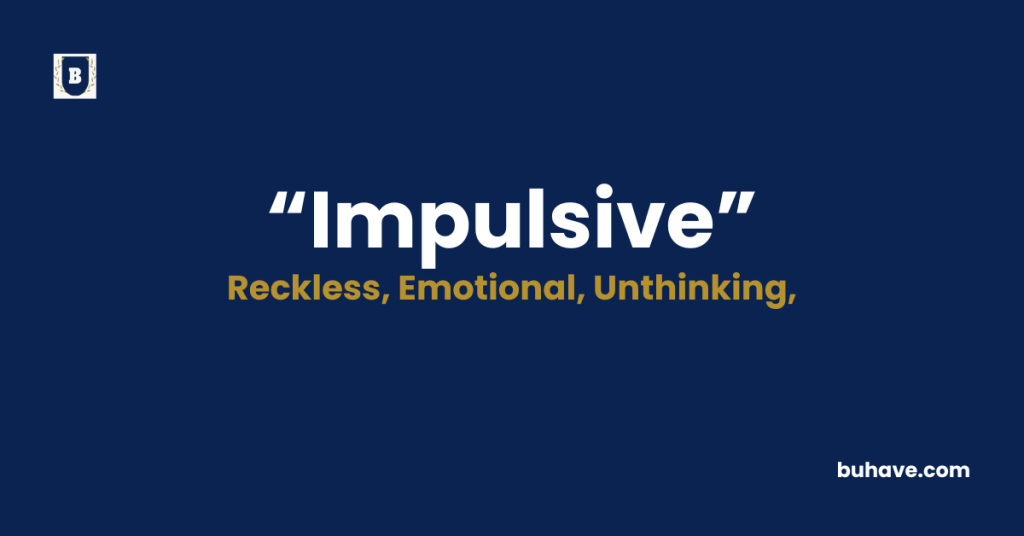The word Impulsive (Adjective) refers to actions taken suddenly without careful thought or planning. In this guide, you’ll learn the full definition, synonyms, antonyms, etymology, and real-life examples of how to use Impulsive correctly in sentences.
Impulsive Explained in Depth
A complete and detailed guide to the word Impulsive including meaning, definition, examples, etymology, synonyms, and antonyms.
Meanings of Impulsive
Impulsive means acting or reacting quickly based on sudden feelings or urges, rather than through deliberate thinking or logic.
Definition
Impulsive refers to actions, decisions, or behaviors that are spontaneous and not fully thought through. These actions often result from strong emotions or desires. An impulsive person might make quick decisions, such as spending money without a budget or saying something without considering its impact. Although impulsiveness can sometimes reflect confidence or spontaneity, it is often viewed as risky because it lacks planning or foresight. For example, someone might impulsively quit a job during a heated argument, only to regret it later. Children are often impulsive because their self-control is still developing. In adults, impulsiveness may be linked to stress, emotional reactions, or certain personality traits.
While being impulsive is not inherently negative, it usually requires balance to avoid negative outcomes. It’s helpful to pause and reflect before making choices that carry long-term consequences.
Etymology
The word “impulsive” originates from the Latin verb impellere, meaning “to push or drive.” This combines in- (into) and pellere (to push). From Latin, it entered Old French as impulsif, then Middle English in the late 14th century. Initially, the term described forces or energies that caused motion. Later, it came to refer to psychological urges or emotional pushes that lead to spontaneous action. Over time, “impulsive” evolved into a term widely used to describe people or behaviors characterized by quick, emotion-driven choices.
While the concept is common in psychology and self-help contexts today, its roots clearly reflect the idea of an inner drive or force that leads someone to act suddenly. This original sense of “push” remains at the heart of how we use the word in modern English.
Example Sentences
- She made an impulsive decision to book a trip without telling anyone.
- Buying that expensive jacket was an impulsive move he soon regretted.
- His impulsive nature often gets him into trouble at work.
Impulsive Synonyms
- Spontaneous
- Hasty
- Unplanned
- Reckless
- Sudden
- Instinctive
- Careless
- Impetuous
- Capricious
- Emotional
Impulsive Antonyms
- Thoughtful
- Planned
- Deliberate
- Careful
- Measured
- Cautious
- Rational
- Judicious
- Predictable
- Disciplined
FAQs about Impulsive
Here’s a FAQ-style guide about the word “Impulsive”
1. What does “impulsive” mean?
It describes acting without thinking, based on sudden urges or emotions.
2. Is being impulsive a bad trait?
Not always. While it can lead to mistakes, it may also show creativity or boldness.
3. Can impulsive behavior be controlled?
Yes. Techniques like mindfulness, planning, and self-reflection help reduce impulsive actions.
4. Is impulsiveness the same as spontaneity?
They’re similar, but spontaneity often has a positive tone, while impulsiveness suggests risk.
5. Who tends to be impulsive?
Children, teens, and some adults—especially under stress—may act impulsively at times.

















